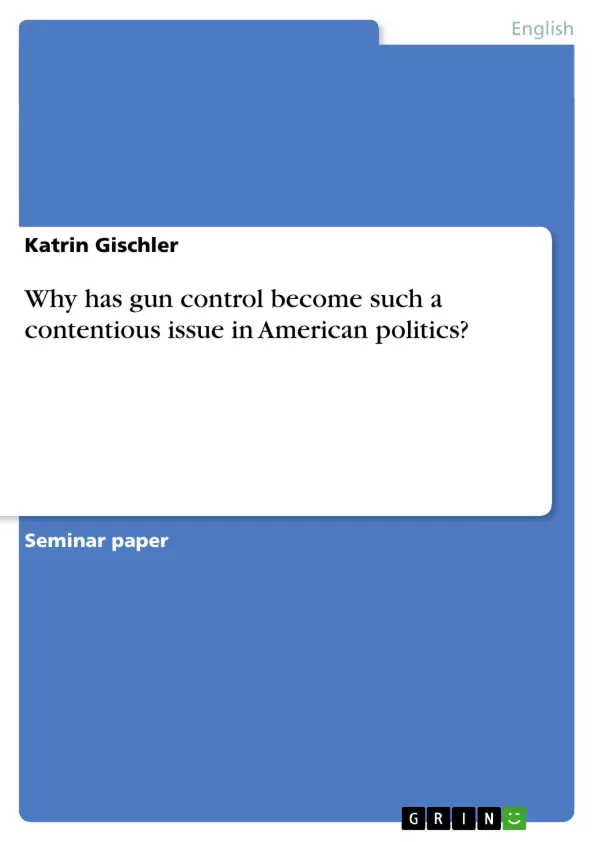The question why gun control has become such a contentious issue in American politics has to be lighted up from different perspectives, both historically and politically. America is undoubtedly one of the countries with the largest private firearms arsenals, and very likely the leading one worldwide. Periodic assassinations and assassination attempts as well as mass shootings like the Columbine High School massacre in April, 1999, focused national attention and have pushed the debate and governmental regulations over gun control. A close look on America’s gun history is needed in order to understand why firearms play such an important role in America’s history which distinctly diverges from the rest of the world. Nevertheless, American citizens and their views on the gun control issue are split into the policies of gun control proponents and their opponents which are resembled in interest groups who play an important role in the United States political procedure. Thus, it is of interest in how far the policies of both sides diverge and how successful they are in influencing the legislative process.
Inhaltsverzeichnis (Table of Contents)
- Introduction
- The History of Guns in America
- Gun Control
- Proponents
- Opponents
- Conclusion
Zielsetzung und Themenschwerpunkte (Objectives and Key Themes)
This essay aims to explore the historical and political factors contributing to the contentious nature of gun control in American politics. It examines the historical significance of firearms in the U.S., analyzing their role in shaping American identity and culture, and ultimately, the deeply embedded constitutional right to bear arms. The essay delves into the debate surrounding gun control, examining the arguments of both proponents and opponents.
- The historical evolution of the right to bear arms in the U.S.
- The role of firearms in American history and identity.
- The arguments for and against gun control.
- The influence of interest groups on gun control policy.
- The impact of gun violence on the debate over gun control.
Zusammenfassung der Kapitel (Chapter Summaries)
The introduction establishes the context of the gun control debate in the U.S., highlighting the high rates of gun violence and the historical significance of firearms in American society. It points to the need to examine the historical roots of gun culture in order to understand why gun control remains such a contentious issue.
Chapter two delves into the history of guns in America, starting with the ratification of the Second Amendment and its implications for the right to bear arms. It explores the importance of firearms in early American society, from hunting and self-defense to the role of militias in the War of Independence. This chapter analyzes the historical development of gun culture and its enduring significance.
Chapter three examines the multifaceted debate surrounding gun control. It explores the arguments of both proponents and opponents, analyzing their perspectives on issues such as public safety, individual rights, and the role of government regulation.
Schlüsselwörter (Keywords)
The key terms and concepts explored in this essay include the Second Amendment, gun culture, gun violence, gun control, the National Rifle Association (NRA), interest groups, political lobbying, and historical context.
Frequently Asked Questions
Why is gun control a contentious issue in the United States?
The debate is fueled by deeply embedded historical traditions, the constitutional interpretation of the Second Amendment, and a unique gun culture that views firearms as essential for individual liberty and self-defense.
What is the significance of the Second Amendment?
The Second Amendment protects the right of the people to keep and bear arms. It is the legal cornerstone for opponents of gun control who argue it guarantees an individual right to own firearms.
How do mass shootings affect the gun control debate?
Events like the Columbine High School massacre push the issue to the forefront of national attention, leading to increased calls for stricter regulations and legislative changes from proponents of gun control.
Who are the main opponents of gun control laws?
Opponents are often represented by powerful interest groups like the National Rifle Association (NRA), who argue that regulations infringe on constitutional rights and do not effectively deter crime.
What role do interest groups play in the legislative process?
Interest groups on both sides of the issue use lobbying, campaign funding, and public relations to influence lawmakers and shape the outcome of gun-related legislation.
- Quote paper
- Katrin Gischler (Author), 2004, Why has gun control become such a contentious issue in American politics?, Munich, GRIN Verlag, https://www.grin.com/document/47128



